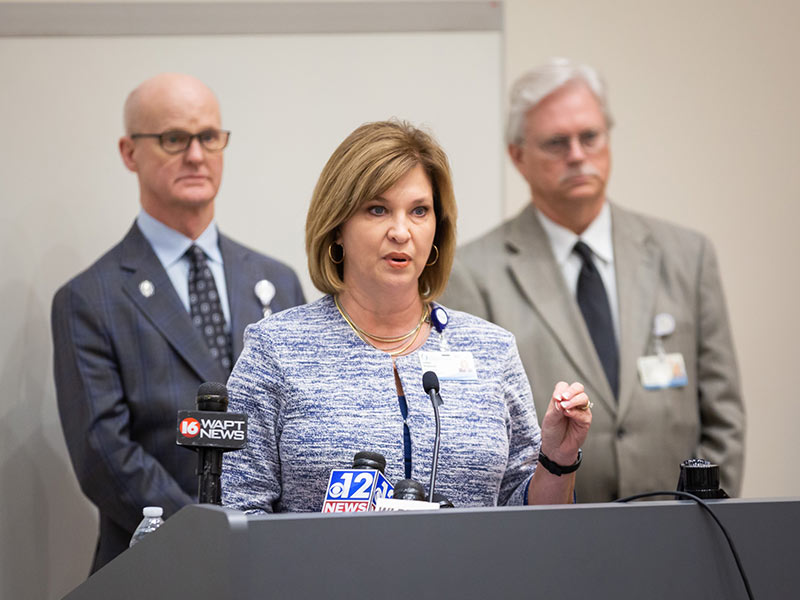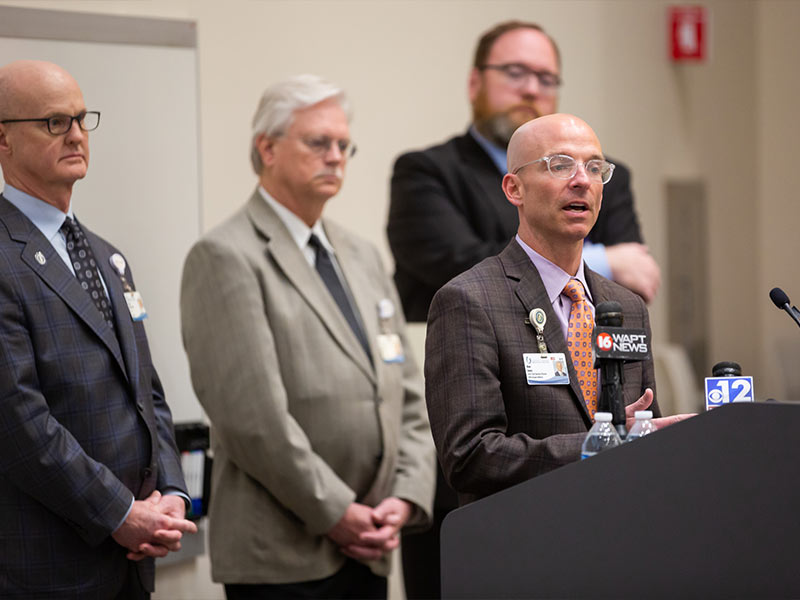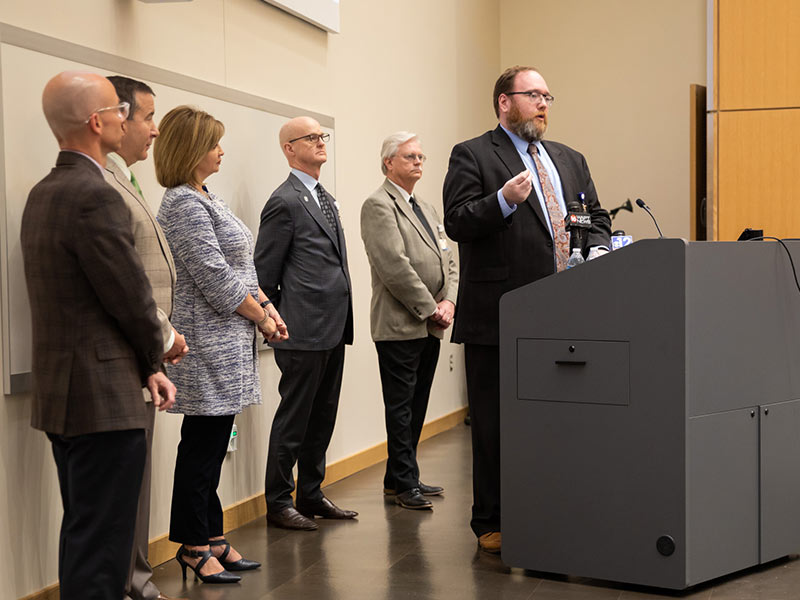UMMC leaders detail preparations for care of COVID-19 patients

A crush of patients with COVID-19, the disease caused by the novel coronavirus, will soon impact hospitals in Mississippi as the pandemic spreads from community to community.
In response, the University of Mississippi Medical Center is “bringing to bear the full force of resources we have to address this,” said Dr. LouAnn Woodward, vice chancellor for health affairs and the Medical Center’s top executive.
Woodward and other Medical Center leaders updated statewide media with what’s known about the highly contagious virus, which had killed 110 people and sickened close to 8,000 in the United States as of mid-Wednesday. Some media attended in person, with others listening in via conference call.
Globally, more than 200,000 have been infected, with the death toll numbering 8,732, also as of mid-Wednesday. The Mississippi State Department of Health listed on its website a total 34 people in the state confirmed positive for COVID-19, spanning a total 14 counties, and MSDH testing of 513 residents. Those numbers are escalating daily.

No hospital nationally or globally can be fully prepared for a pandemic infection, said Dr. Alan Jones, chair of the Department of Emergency Medicine. Given that, “we are ramping up to prepare for the tidal wave of patients we know will hit us,” he said. “Our teams are working all day, every day, focusing on when this reality comes face to face with us, so that we can be as ready as we can be.”
Among the Medical Center’s actions:
- Visitation policies have been sharply restricted to decrease the number of people who have contact with health-care workers, patients and a limited number of family members.
- Clinic visits and many elective surgeries have been postponed across the board.
- Aggressive steps have been taken to conserve personal protective equipment, or PPE, that includes face masks, gloves, gowns and face and eye shields. All clinical activities for students have been suspended; groups of caregivers who round from patient to patient have been cut to only a necessary handful entering a patient room; and managers are taking steps to ensure patients, families and employees don’t take home PPE.
The Medical Center is receiving partial shipments of PPE and can’t count on help from any federal or state agencies for reinforcements. “We don’t see that as the cavalry coming to help us,” Woodward said. “The demand outstrips the supply.”
- The Medical Center has the capability to increase to more than 100 its number of negative pressure patient rooms, which stands at 60. Negative pressure rooms, often used for patients with infectious diseases, are designed to filter contaminated air out of the hospital’s air-handling system.
- A telehealth app is in development that can be downloaded on a smartphone, giving Mississippians the opportunity to be screened for COVID-19 without having to make an in-person visit. “You will go to a virtual waiting room and be picked up by a provider, but only for COVID-19 screening,” Jones said. The app should be available in the next few days.
- UMMC researchers are working around the clock to develop an in-house test for the virus, with the technology expected to be available in several weeks. As the state’s only academic medical center, “not only do we have physicians, but we have the scientists necessary to create this test,” said Dr. Richard Summers, associate vice chancellor for research.
Those who believe they need to be tested for COVID-19 should not come to an emergency room, Jones said. He urges them instead to use telehealth to obtain screening or contact their provider, and let an emergency room be the resource for truly sick and injured people.
“We need people to allow us to do our job and take care of the sick, sick patients at the (UMMC) Emergency Department,” Jones said. “If you are not in need of hospitalization, stay away from the ED. Most patients just need reassurance and the ability to isolate themselves.”
Those with mild cases should stay home until 72 hours after all symptoms have resolved, he said. “Seek care only if you get worse, or if you become short of breath,” Jones said, and if that’s the case, “please, on the front end, notify the provider first” so that steps can be taken to protect health care workers and other patients.
Medical Center caregivers are urging the public to practice social distancing, or staying no closer than six feet to any person; perform frequent hand washing; stay home from work if sick; and taking many other measures intended to help curb the virus’ spread.
“These things are not aimed at preventing people from getting the virus,” Jones said. “It’s to give health care a fighting chance. If not, our ability to care for any patient will be hampered.”

Complicating that is the state’s high rates of chronic diseases that place many at greater risk for complications if they contract the virus, said Dr. Jonathan Wilson, UMMC’s chief administrative officer. “That’s the group of patients we are worried about the most,” he said.
Screening for the virus has pivoted from checking for travel to a highly affected country, to considering anyone for testing who has the primary symptoms of cough, fever and respiratory issues, Jones said. “This is a reality. It is here, and it will affect all of us.”
Jones urges Mississippians to stay abreast of a rapidly changing situation and take steps to protect themselves and others. That includes physicians, nurses and others in the health care community that give bedside care to all patients, not just those who will become ill from COVID-19.
“This is not to be taken lightly,” he said. “This will affect us profoundly. This is not another bad flu season. School children will be reading about this 50 years from now.”
Read more about COVID-19 and UMMC preparedness here.


